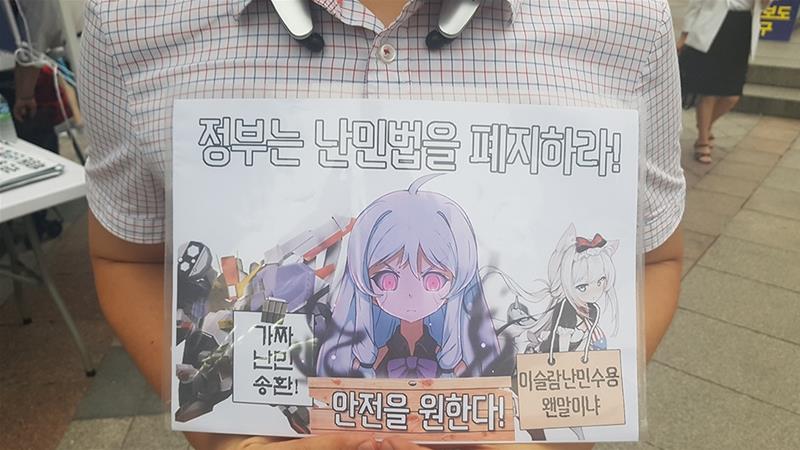Hawzah News Agency (Seoul, South Korea) – Ko Minja has yet to meet one of the 550-plus Yemeni asylum seekers who arrived on South Korea's Jeju island earlier this year, or visit any of the areas they are living.
Still, the 59-year-old restaurant owner has no second thoughts about not wanting them on the island.
"The Yemenis are scary. They will rape our women, take our jobs and take over the country. I'm scared of going to the areas where they are living," she told .
Almost 2.2 million migrants are based in South Korea but it was the April arrival of people from war-torn Yemen on Jeju that sparked online outcry and protests on the island, as well as the capital, Seoul.
Her views are based on what she has heard from other people, read online and seen on TV, and according to analysts, hers is a similar case to many Koreans who - due to the ignorance and lack of knowledge of the outside world - have turned up their voices against these Yemenis.
South Korea's refugee acceptance rate stands at around four percent. From 1994 to June 2018, it received 42,009 refugee applications. Out of the 20,974 completed applications, only 849 were granted refugee status (1,550 were given humanitarian status, a temporary permit allowing individuals to work after six months but one that needs to be renewed).
Jeju has a population of around 600,000 and a recent survey with 500 islanders revealed 90 percent felt insecure about going outside since the Yemenis' arrival.
A rise in fake stories and anti-Islam propaganda online has also spurred on the protesters in South Korea but, according to Il Lee, a human rights lawyer, the anti-refugee sentiment is not new in Korea. There are also worries that the spread of false information is going by unnoticed and the government's apparent lack of involvement in the matter has failed to calm down the situation.
"There is a strong phenomenon in Korea that people blame foreigners for everything that goes wrong," said Lee.
"If there is low employment rate, they say migrants have taken our jobs. When it comes to women's safety, they say things will worsen if we take on more refugees.
"But when it comes to the Yemeni asylum seekers, there is a strong anti-Islam sentiment. This situation shed light on the refugee issue and people are against that. The situation is getting more dire because not many Koreans have the experience of living with Muslims and have never met one in their lives."
On Saturday, around 100 anti-refugee campaigners hosted a fourth protest outside Seoul Station to demand from the government to deport all the "fake refugees" from Jeju and not accept any other asylum seekers.
The Yemenis are termed "fake refugees" because, according to locals, Koreans have this image in their minds where refugees are poor people without money or clothes.
"If you see pictures from various articles, most of them are men. I find this weird. It's hard to understand that people who are desperate for survival possess iPhones and iPads. They look like tourists," said a 38-year-old protester in Seoul who refused to give his name.
"I don't want the government to accept refugees at all, especially those from Muslim countries. Their culture and religion are very different from us. I don't want to see this bad religion in our country where our children will grow up and it will bring harm to them."
When questioned on the reason behind the anti-Islam stance and sentiment, the organizers, most of them having their faces covered, said anyone who did not agree with their views should not be present at the protest.
"If you ask these people what is Islam, they won't have a clue. And this is why this issue is becoming so huge," said Jumin Hong, director of Korea Diaconia.
"This fake news about Islam is very provocative. They are saying Muslims are terrorists, sexually abuse and harass people and all this is being shared very openly on social media."
Most of the politicians in Korea have not talked on the issue while some of the civil bodies and relief organisations working for the Yemenis' cause have been threatened. In June, Yemen was taken off the list of countries that was allowed visa-free arrival on Jeju island.
More than 700,000 South Koreans filed an online petition urging the government to stop its visa-free policy for Yemen and send the "fake refugees" back home.
In response, the government announced plans to tighten the country's Refugee Act, a move seen by critics as supportive to the protesters' demands.
In an interview, Choo Mi-ae, chief of Korea's ruling party, admitted there was 'lack of understanding and room for improvement'.
"The Korean public didn't have many opportunities to encounter cultural diversity," said Choo.
"But like other countries, we have certain procedures to go through but you shouldn't term the whole country as anti-refugee based on the actions of a few people and the online petition. This country helps out a lot financially abroad and one of the former UN chief was Korean."
Back at the protest in Seoul, the anti-Islam slogans got louder and louder.
Those who supported the refugees observed from the sidelines as organisers showed videos of the wars ravaging the Middle East, warning locals of what might happen in Korea if the government grants them refugee status.
But despite the threats and sentiments, the majority of those helping the Yemenis in Jeju are Koreans - and in Seoul, many expressed hope that the government would take a stronger stance on the issue.
"I am sorry for all this. I am sorry for what you are seeing. This is not the Korea that I know. I hope we can all educate ourselves and help each other out," a 19-year-old university student said as she walked away from the protest.

